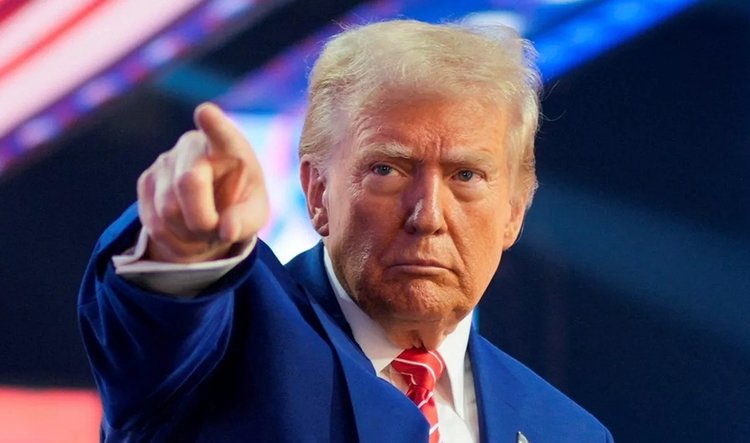Donald Trump authorises 90-day pause in tariffs on most countries except China
07:25 - 10 April 2025

In a post on Truth Social, Trump said he was imposing a steeper tariff rate of 125% on Beijing because of 'the lack of respect China has shown the World's Markets.'
US President Donald Trump has said he has authorised a 90-day pause in trade tariffs for most countries but has left China out of the new arrangement.
In a post on Truth Social, Trump said he was imposing revised tariffs of 125% on imports from China "effective immediately" because of "the lack of respect China has shown the World’s Markets."
In his social media post, Trump initially suggested that the 90-pause would apply to the more than 75 countries who had reached out to negotiate new trade deals with Washington since the 'Liberation Day' levies package was announced.
But the White House later clarified that the 90-day suspension would apply to most if not all countries and that a "universal 10% tariff" would apply in the meantime while trade negotiations take place.
Global markets surged following the news with the Dow Jones index jumping 2,000 points within minutes of the announcement.
Trump's latest raft of tariffs kicked in shortly after midnight and included 104% on products from China, 20% on the European Union, 24% on Japan and 25% on South Korea.
US administration officials had tried to reassure voters, Republican lawmakers and CEOs that the rates are negotiable, but also said that process could take months.
China imposes 84% tariff on US goods as Trump trade war escalates
Beijing will raise tariffs on US goods from 34% to 84% starting on Thursday, 10 April an action that follows the US increasing tariffs on Chinese goods and tensions over trade policies.
China said it is raising its retaliatory tariff on the US to 84%, up from 34%, effective Thursday.
In a statement, the Chinese finance ministry said the new tariff rate will take effect from 12:01 am CST on 10 April (7:01 pm CEST on Wednesday).
"On 8 April 2025, the US government announced that it would increase the 'reciprocal tariff' on Chinese goods exported to the US from 34% to 84%," the statement said.
"The US's practice of escalating tariffs on China is a mistake on top of a mistake, which seriously infringes on China's legitimate rights and interests and seriously damages the rules-based multilateral trading system," it added.
As a result, it was further noted, the tariffs on imported goods originating in the United States will go up from 34% to 84%.
It comes after Beijing once again vowed earlier to “fight to the end” against US President Donald Trump's tariffs in a lengthy policy statement, arguing that trade between the two countries is in balance as a 104% tax on the country's exports to the US came into effect.
Will China negotiate with the White House?
The government declined to say whether it would negotiate with the White House, as many other countries have started doing.
“If the US insists on further escalating its economic and trade restrictions, China has the firm will and abundant means to take necessary countermeasures and fight to the end,” the Ministry of Commerce wrote in a statement introducing the white paper.
Last Friday, China announced a 34% tariff on all goods imported from the US, export controls on rare earth minerals, and a slew of other measures in response to Trump's “Liberation Day” tariffs. Trump then added an additional 50% tariff on goods from China, saying negotiations with them were terminated.
So far, China has not appeared interested in bargaining. “If the US truly wants to resolve issues through dialogue and negotiation, it should adopt an attitude of equality, respect and mutual benefit,” Ministry of Foreign Affairs spokesman, Lin Jian, said on Wednesday.
The paper says that the US has not honoured the promises it made in the phase 1 trade deal concluded during Trump’s first term.
As an example, it said that a US law that would ban TikTok unless it is sold by its Chinese parent company violates a promise that neither would “pressure the other party to transfer technology to its own individuals”.
TikTok-trade tit-for-tat continues
Trump signed an order to keep TikTok running for another 75 days last week after a potential deal to sell the app to American owners was put on ice. ByteDance representatives called the White House to indicate that China would no longer approve the deal until there could be negotiations about trade and tariffs.
The paper also argued that taking into account trade in services and US companies’ domestic Chinese branches, economic exchange between the two countries is “roughly in balance”.
It says that China had a trade in services deficit with the US of $26.57 billion (about €24.5bn) in 2023, which is composed of industries like insurance, banking and accounting. Trump's tariffs were designed to close trade deficits with foreign countries, but those were calculated only based on trades in physical, tangible goods.
“History and facts have proven that the United States’ increase in tariffs will not solve its own problems,” said the statement from the Chinese commerce ministry.
"Instead, it will trigger sharp fluctuations in financial markets, push up US inflation pressure, weaken the US industrial base and increase the risk of a US economic recession, which will ultimately only backfire on itself."
(Source: Euronews)

